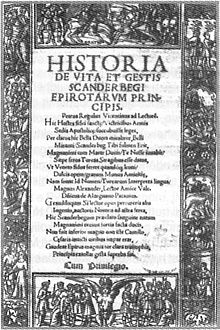- Marin Barleti
-
Marin Barleti
Marinus Barletius
Born c. 1450
Shkodër, League of Lezhë, modern day Shkodër, AlbaniaDied c. 1512/1513 (aged 62/63)
Padua, Republic of Venice, modern day Padua, ItalyNationality Albanian Institutions Church of St. Stephan Known for Author of Historia de vita et gestis Scanderbegi Epirotarum principis Marin Barleti (Latin: Marinus Barletius, Italian: Marino Barlezio; c. 1450, Shkodër – c. 1512/1513). was an Albanian historian and Catholic priest.[1] He is considered the first Albanian historian, especially because of his biography on Skanderbeg, translated in many languages in the 16th to the 18th centuries.
Contents
Life
Barleti lived in Shkodër and was a scholar and a clergyman. In 1474, the Ottoman Empire besieged Shkodër and Barleti participated in the defense of the town, both in the first siege in 1474 and the second in 1478. When Shkodër fell to the Ottomans, he escaped to Italy where he became a scholar of history, classical literature and the Latin language. In Venice he wrote About the excellent Prince of the Epirots, George Castrioti's, life, character and deeds, especially against the Turks. Because of his famous exploits he was surnamed Scanderbeg, that is, Alexander the Great. Thirteen books by Marin Barleti of Shkodra (Latin: De Vita Moribus Ac Rebus Praecipue Aduersus Turcas, Gestis, Georgii Castrioti, Clarissimi Epirotarum Principis, qui propter celeberrima facinora, Scanderbegus, hoc est, Alexander Magnus, cognominatus fuit, libri Tredecim, per Marinum Barletium Scodrensem conscripti) (published between 1508 and 1510), The Siege of Shkodër (Latin: De obsidione Scodransi, Venice, 1504) and A Brief History of Lives of Popes and Emperors (Latin: Compendium vitarum pontificum et imperatorum, Venice, 1555).[2] He was from Skodra.
Also shortly known as the Historia de vita et gestis Scanderbegi Epirotarum principis, the book is the biography of the Albanian national hero Skanderbeg.[2] The book was printed in Rome between 1508 and 1510.[2] and during the 16th century spread in several languages and eventually was translated from Latin into Portuguese four times and German seven times. It is still the foundation of Skanderbeg studies, and also established the Skanderbeg cult that was important for the formation of the Albanian national self-consciousness. The book is considered an Albanian cultural treasure.
Other known works include:[3]- Expugnatione Scodrensi a Turcis, published in three volumes in Venice in 1504 and reprinted in Basel in 1556, translated in Italian as "Storia dell' origine et imperio de Turchi" and in French.
- Chronicum Turcicum, (Frankfurt) 1578, in 3 volumes.
- Compendium vitarum Summorum Pontificium usque ad Marcellum II Imperatorumque Romanorum (English: Compendium of biographies of Popes and Roman emperors until Marcellus II), although this last work is perhaps erroneously attributed to Barleti.[3]
He made up spurious correspondence between Vladislav II of Wallachia and Skanderbeg wrongly assigning it to the year 1443 instead to the year of 1444.[4] Barleti also invented correspondence between Skanderbeg and Sultan Mehmed II to match his interpretations of events.[5]
The old library of Shkodër and a publishing house have been named after Marin Barleti. Recently a University in Albania has been established under his name.
See also
References
- ^ Setton, Kenneth M. (1978). The papacy and the Levant (1204-1571). (null ed.). Philadelphia: Amer.philos.soc.. pp. 73. ISBN 9780871691279. http://books.google.com/books?id=0Sz2VYI0l1IC&pg=PA38&dq=turakhan+beg#v=onepage&q=Barletius&f=false. "...perhaps of Italian origin."
- ^ a b c Jensen, Minna Skafte. "A Heroic Ta le: Marin Barleti's Scanderbeg between orality and literacy". http://miqesia.dk/Barleti-Scanderbeg.htm#Barleti%27s%20book. Retrieved 7 October 2010.
- ^ a b Rose, Hugh James (1857). A new general biographical dictionary. III. London: Kings College. p. 185. ISBN 1141963787. http://books.google.com/books?id=1yoAAAAAQAAJ&pg=PA185&lpg=PA185&dq=De+expugnatione+Scodrensi+a+Turcis#v=onepage&q=De%20expugnatione%20Scodrensi%20a%20Turcis&f=false.
- ^ Setton, Kenneth (1976—1984), The Papacy and the Levant, 1204-1571, four volumes, American Philosophical Society, p. 73, ISBN 978-0-87169-114-9, http://books.google.com/books?id=0Sz2VYI0l1IC&pg=PA38&dq=turakhan+beg#v=onepage&q=barletius&f=false, "...... The spurious correspondence of July and August 1443, between Ladislas and Scanderbeg (made up by Barletius, who should assigned it to the year 1444) ..."
- ^ Setton, Kenneth (1976—1984), The Papacy and the Levant, 1204-1571, four volumes, American Philosophical Society, p. 73, ISBN 978-0-87169-114-9, http://books.google.com/books?id=0Sz2VYI0l1IC&pg=PA38&dq=turakhan+beg#v=onepage&q=barletius&f=false, "...... He also invented a correspondence between Skanderbeg and Sultan Mehmed II to fit his interpretations of the events in 1461—1463 ..."
Sources
- Historia de vita et gestis Scanderbegi Epirotarum Principis Treasure of the National Library of Albania displayed by The European Library
Categories:- 1450s births
- 1510s deaths
- Albanian historians
- People from Shkodër
- Albanian Roman Catholics
- Albanian Roman Catholic priests
- 15th-century Roman Catholic priests
- 16th-century Roman Catholic priests
- 16th-century historians
Wikimedia Foundation. 2010.

